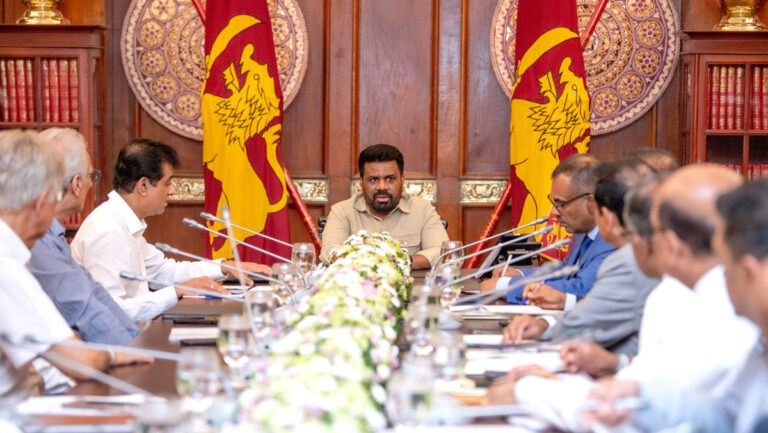🎧 Listen to This Article
COLOMBO – Sri Lanka is preparing to launch urgent diplomatic discussions with the United States to seek relief from sweeping 44% tariffs imposed by former US President Donald Trump on Sri Lankan exports, a move that could severely impact the nation’s trade competitiveness.
President Anura Kumara Dissanayake has appointed a high-level economic committee to formulate strategic responses and initiate immediate negotiations with US officials. The decision follows a comprehensive review of the newly imposed tariffs and their potential consequences on Sri Lanka’s export-driven industries.
Presidential Committee Reviews Strategy
In a recent meeting at the Presidential Secretariat, President Dissanayake convened with the appointed Special Committee to examine the tariff implications and finalize a national response strategy.
The committee includes:
- Duminda Hulangamuwa – Senior Economic Advisor to the President
- Mahinda Siriwardana – Secretary, Ministry of Finance
- Nandalal Weerasinghe – Governor, Central Bank of Sri Lanka
- A. Vimalaneththiraja – Secretary, Ministry of Trade
- Mangala Wijesinghe – Chairman, Export Development Board
- Shiran Fernando – Chief Economic Advisor, Ceylon Chamber of Commerce
- Top private sector leaders: Ashroff Omar (Brandix), Sharad Amalean (MAS Holdings), Mohan Pandithage (Hayleys Group), and Ananda Caldera
The committee’s recommendations include initiating “prompt discussions” with the US government to explore tariff relief mechanisms and bilateral trade adjustments.
Export Impact & Economic Concerns
The 44% reciprocal tariffs—first floated by Trump in late 2024 and implemented in early 2025—target multiple countries, including Sri Lanka, as part of a broader protectionist strategy aimed at reshaping US trade balances.
Sri Lanka’s key apparel and manufacturing sectors, which heavily rely on US markets, are particularly vulnerable. According to trade officials, the tariffs could result in:
- Sharp decline in export volumes
- Job losses in key sectors like garments and rubber products
- Widening trade deficit if retaliatory options are limited
An internal government analysis warns that without immediate diplomatic engagement, the tariffs could “erode export competitiveness and investor confidence.”
Domestic Policy Tensions
Sri Lanka’s own protectionist policies, including high import taxes and preferential treatment for politically connected sectors, have long drawn criticism from economists. The Trump-style tariff exposure underscores how such internal policies have made the economy less agile and globally competitive, analysts say.
A senior economist at the Ceylon Chamber of Commerce remarked:
“This is a wake-up call. You can’t protect local inefficiencies and simultaneously expect global market access. The system needs rebalancing.”
What’s Next?
The Sri Lankan government is expected to formally engage the US Trade Representative’s office and lobby for exemptions or mitigated tariff terms. Industry leaders are also calling for:
- A diversification of export markets
- Structural reforms to improve domestic competitiveness
- Fast-tracking trade pacts with Asia and the EU
If talks fail, Sri Lanka may face prolonged export contraction and a need to restructure its export strategies entirely.
For further details, clarification, contributions, or any concerns regarding this article, please contact us at editorial@tax.news. We value your feedback and are committed to providing accurate and timely information. Please note that our privacy policy will handle all inquiries



